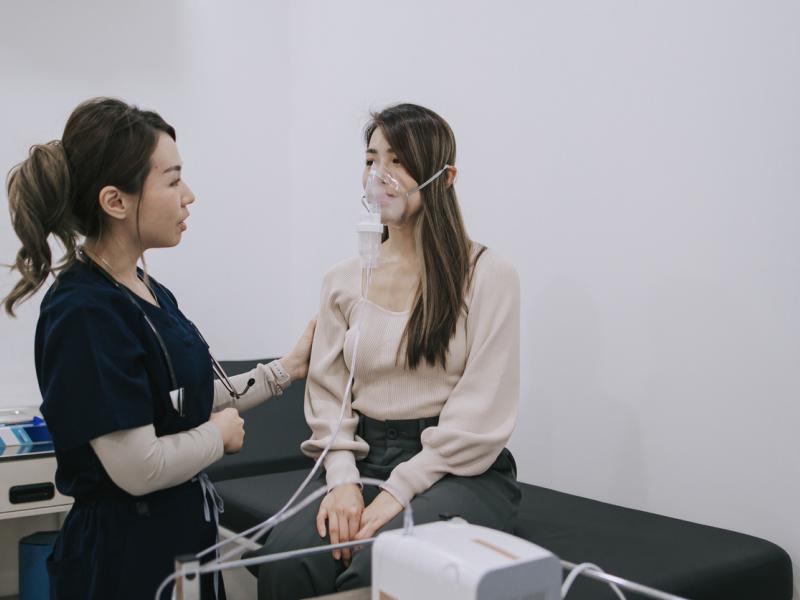Walking pneumonia is a mild but disruptive form of pneumonia with symptoms like a lingering cough...
Read More
Inhale confidence, exhale doubt. Managing pulmonary hypertension starts at Inspira.
Pulmonary hypertension is a potentially life-threatening condition characterized by elevated blood pressure in the arteries of the lungs. Normally, the pulmonary arteries carry blood from the heart to the lungs to pick up oxygen. In someone with pulmonary hypertension, the artery walls become thickened and narrowed, increasing resistance to blood flow. As a result, the right side of the heart has to work harder to pump blood through the lungs, leading to strain on the heart muscle, potentially causing it to enlarge and weaken over time. If left untreated, pulmonary hypertension can lead to serious complications such as right-sided heart failure and arrhythmias and can be fatal.
Early intervention in pulmonary hypertension is essential to manage symptoms, slow disease progression, and improve quality of life. It allows doctors to identify underlying causes and tailor therapies, enhancing treatment outcomes.
Some symptoms of pulmonary hypertension can indicate a medical emergency. Seek medical help right away if you experience severe chest pain, sudden difficulty breathing, fainting, or other serious symptoms. Common symptoms associated with pulmonary hypertension include:
Diagnosing pulmonary hypertension involves a comprehensive assessment integrating medical history, physical examination, imaging studies and pulmonary function tests (PFTs), and may involve invasive procedures. Your evaluation may include echocardiography, a noninvasive imaging test that uses sound waves to create images of the heart and measure pulmonary artery pressure, and right-heart catheterization, an invasive procedure that measures pulmonary artery pressure and assesses heart function. Your doctor may also recommend additional imaging studies and blood tests to assess heart and lung function. These diagnostic tests help confirm a diagnosis and determine the condition’s severity.


Medications may include vasodilators to relax blood vessels, diuretics to reduce fluid buildup and targeted therapies to address the underlying causes of pulmonary hypertension.

Pulmonary rehabilitation offers structured exercise training, education and support to improve your physical endurance, breathing techniques and overall quality of life.

For severe cases of pulmonary hypertension, advanced therapies target different pathways and aim to improve blood flow, relieve symptoms and slow disease progression.
At Inspira, our approach to treating pulmonary hypertension, centers around personalized care that improves your respiratory health and quality of life. We understand the challenges of living with pulmonary hypertension and are committed to supporting you every step of the way. Our multidisciplinary team collaborates closely to develop holistic treatment plans tailored to your needs and goals. From accurate diagnosis to ongoing management and support, we are dedicated to improving heart and lung function, alleviating your symptoms, and improving your overall well-being. Through a combination of medication management, pulmonary rehabilitation, and advanced therapies, we strive to empower you to live your best life—despite the challenges you face with your condition.
Pulmonary hypertension can be associated with various underlying conditions such as heart diseases, lung diseases, blood clots in the lungs and certain genetic factors. Factors like obesity, sleep apnea and exposure to certain drugs or toxins may increase the risk of developing pulmonary hypertension.
While pulmonary hypertension cannot always be prevented, managing underlying risk factors and conditions such as heart and lung diseases, maintaining a healthy lifestyle with regular exercise and a balanced diet and avoiding exposure to harmful substances can help reduce the risk of developing pulmonary hypertension or slow its progression.
Pulmonary hypertension can run in families. Certain gene mutations or genetic predispositions may increase the likelihood of developing pulmonary hypertension. Genetic testing and counseling may be recommended for individuals with a family history of pulmonary hypertension or related conditions.
Pregnancy can pose significant risks for women with pulmonary hypertension due to the increased strain on the heart and lungs. Talk to your doctor if you have pulmonary hypertension and are pregnant or are planning on becoming pregnant. Close monitoring and specialized care are essential during this time to minimize risks and ensure the best possible outcomes for you and your baby.

Walking pneumonia is a mild but disruptive form of pneumonia with symptoms like a lingering cough...
Read More
Long COVID refers to a range of persistent symptoms that can linger for weeks, months or years after...
Read More
Hurkle-durkle refers to the cozy, mindful act of unwinding before bed, focusing on relaxation and...
Read More
The material set forth in this site in no way seeks to diagnose or treat illness or to serve as a substitute for professional medical care. Please speak with your health care provider if you have a health concern or if you are considering adopting any exercise program or dietary guidelines. For permission to reprint any portion of this website or to be removed from a notification list, please contact us at (856) 537-6772